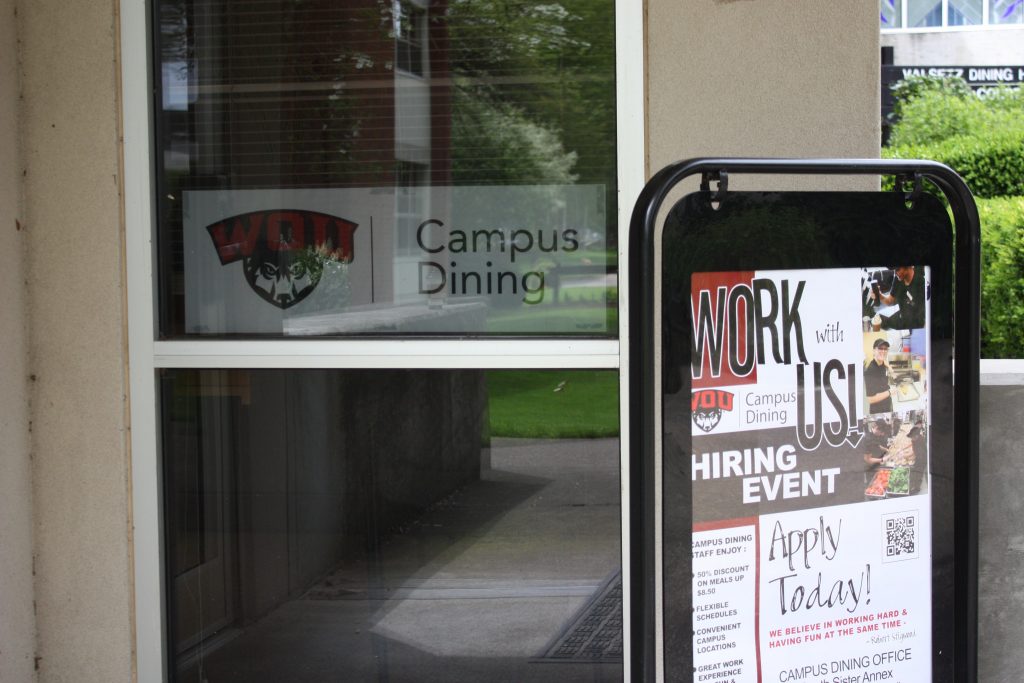
Rebecca Meyers | Lifestyle Editor
At the start of almost every term, signs pop up around the on-campus cafes, dining areas and other places informing students that they are hiring. These campus positions exclusively hire students — but why do the signs appear so often? Surely, Western understands the struggle of working students and does everything they can to ensure that student employees have a reliable, accommodating job to depend on? And why wouldn’t they stick around longer if that was the case?
Shortly after being enrolled in Western, I figured out that most — not all, but most — campus jobs are not exactly the most desirable. I remember distinctly two different occasions that I, in an offhand manner, mentioned I had thought about applying for one for convenience’s sake and was immediately informed by a friend or classmate that this was a bad idea. Talking to a few former employees echoed this sentiment towards campus dining, campus recreation and campus safety.
Morgan Taylor, a senior education major, relayed her experience working on campus to me.
“Like any other job, it had its ups and downs. I liked what I did and I learned a lot in my two years I spent there. However, by the end of my time, I felt very under appreciated and taken advantage of in terms of scheduling,” Taylor said. “It ended up being a very negative experience for me because of the way it ended with a certain administrator who I had a hard time communicating with because of their lack of leadership and compassion and understanding that we are students. And as a result, because of the unwillingness to communicate, they forgot to put me on the schedule. This careless mistake cost me three months of pay and if it wasn’t for help from my family, I would have had to drop out of school.”
Another student, who worked in a different department of campus but wished to remain anonymous, expressed similar experience.
“I feel as if working on campus is made into my main priority (over) school and family. Management has made me late to class on several occasions by not giving me and fellow students enough time to close out, gather belongings and walk to class. I also felt and noticed some toxic things happening while in the job and students feeling uncomfortable around those we work with. I understand that many places around campus have these issues and (I) believe these need to be looked into,” said the student.
Two other students, both current employees of Valsetz Dining Hall, gave insight to the campus dining situation.
“There are some faculty on board who do have our best interests at heart and are on our side. But there are still many higher ups that make it feel like an unforgiving environment that expects us to have no lives outside of Valsetz,” said one employee.
The other student added, “Overall I like the people I work with, it’s just the way it’s run… If anyone ever asks if they should apply to Valsetz, I say only if it’s your last option.”
What these experiences reflect is a problem well known on some level or another among many students at Western. To me, this is a disappointing dynamic, one that is clearly detrimental to some student employees for a number of reasons.
Firstly, for students, financial well-being is a big part of maintaining peace of mind and therefore both mental health and academic performance. A student constantly worried about finances will have less energy to focus on schoolwork — and, in a worse case scenario, it can actually compromise their ability to make ends meet. Hours that students are allowed to work are limited to around 20 hours a week, so that students have enough time to attend classes and complete schoolwork. Which, in theory, is great: they’re looking out for students’s time-management needs. However, this does not allow very much room for the financial needs many students face — school fees among them.
Also, looking out for students’s overall well-being should also include providing a workplace that adds as little stress as possible, which is hard to do when it feels like managers don’t fully understand the needs of their employees.
Personally, I have found my off campus job (which is a minimum wage position in food service that is by no means my dream job) much more accommodating to my schedule in a way that allows me to get enough hours, with my manager even asking every employee how many hours they think they can work without stretching themselves too thin, how many hours minimum they need to survive and what their preferable medium between the two is. This eliminates a lot of stress for my coworkers and I, and we usually feel we are in a financially stable position.
This is the kind of respect that anyone should find even in an entry level job, though all too often it isn’t, and for Western student employees to feel that this is lacking is both a poor reflection on the institution as a whole and likely a reason for the negative perception of campus jobs among students.
Another reason this issue should concern Western is that it affects the overall perception of the school that students will leave with and take with them for the rest of their lives, which will possibly affect whether they recommend the school to others, or even whether they decide to complete their degree here.
Overall, it seems that current Western campus jobs could stand to have a reminder that employment is a big part of student lives, and therefore should be treated with as much thought and effort as possible. This would end up benefiting everyone in the long run.
Contact the author at rmeyers17@mail.wou.edu
Photo by Caity Healy

